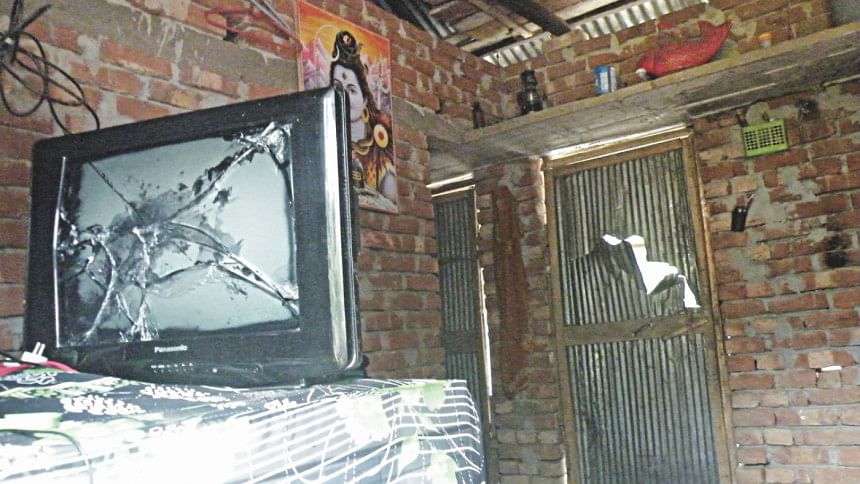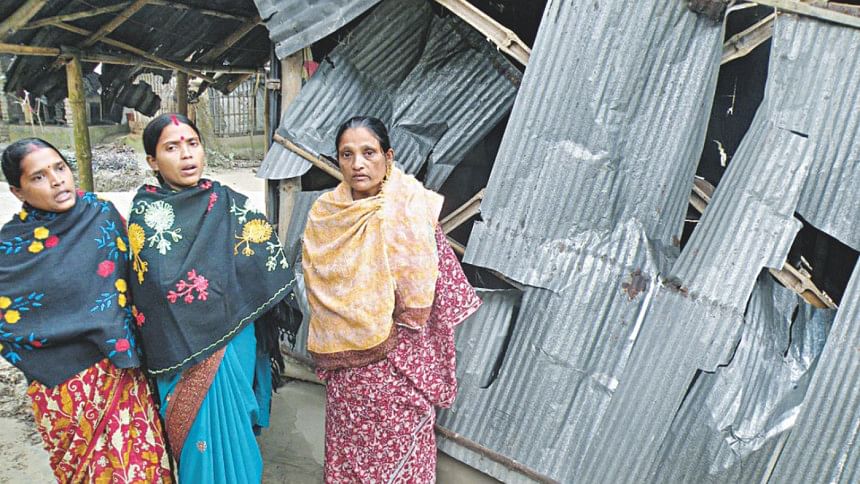The Minority Report

While declaring the schedule for the upcoming general election, Chief Election Commissioner (CEC) KM Nurul Huda in his speech on November 8, commented that people "irrespective of their caste, creed, and religion get into a festive mood on Election Day".
While the CEC's statement may apply to a big part of the population, does it really reflect the reality, at least for the country's minority communities?
As the 11th parliamentary election knocks on our doors, fearful experiences once again come alive for more than 1.5 crore Hindus in Bangladesh. Leaders of the community have already voiced concerns over their security and placed various demands to the government.
"As the national election approaches, we fear that the minority communities might again become the easy target for communal attacks," said Rana Dasgupta, a leader in the community, in an interview with The Daily Star recently.
It is no news that the country has witnessed a gradual but quite drastic decrease in the Hindu population over the last half century. While Hindus comprised 23.1 percent of the population in the then East Pakistan in 1951, the number came down to 14.6 percent in first census of independent Bangladesh. The latest census in 2011 put the number in single digit—9.6 percent.
Dasgupta points to discriminatory policies of successive governments and widespread culture of impunity of perpetrators of violence against the community as the reason for decrease in number—and violence surrounding election only aggravates the vulnerability of this group.
Five general elections have been held so far since the restoration of democracy in the country in early 90s, and during all the election campaigns, a vested group incited communal hatred against minority community tagging them with a particular political party.
After the election in 1991, the people faced torture and repression for around a month and the party which came to power was allegedly involved with it. Two elections held in 1996 were relatively safer, with fewer reports of violence against minority people.
The largest-ever attack came after the 2001 election, with BNP-Jamaat men, who came to power and directly took part in the atrocities with impunity. Minorities, mostly Hindus, were killed, women were raped and their assets looted only because they had voted for the Awami League.
Unfortunately, Awami League leaders often talk and castigate BNP-Jamaat for the atrocities but have since failed to bring the perpetrators to book.
In 2009, the Awami League-led government, following a High Court directive, formed a judicial commission led by retired district judge Mohammad Sahabuddin. The committee submitted a report in January 2012 after investigating about 5,000 incidents and suggested taking action against many, including 25 ministers and lawmakers of the BNP-Jamaat alliance government for their involvement.

However, the commission report was not made public. No action was taken against the perpetrators even after 10 years of Awami League rule.
The 2008 election was a kind of "model election" for the minority community with no violence against them; the case, however, was different in 2014.
This time around, the violence started after the International Crimes Tribunal in February 2013 awarded the death penalty to Jamaat-e-Islami leader Delwar Hossain Sayedee for committing crimes during the Liberation War in 1971.
Hindu people in several districts came under attack simply because several Hindu men gave testimony against Sayedee.
The minority people once again were brutally attacked following the controversial January 5 election, which was boycotted by most of the opposition parties, including the BNP.
Attacks were carried out in Thakurgaon, Dinajpur, Rangpur, Jashore, Bogra, Lalmonirhat, Gaibandha, Rajshahi, and Chattogram.
In a single incident, BNP-Jamaat men vandalised 130 houses of the minority community and torched 10 more in Malopara village in Abhaynagar upazila of Jashore, because the villagers cast their votes against them.
About 600 Hindus of the village had to swim across the Bhairab river and take shelter in Diyapara village under Sridhar union to save their lives.
Similarly, around a hundred temples, several thousand houses, and shops of Hindus were either looted or burned down; several women were raped.
After the incidents, dozens of cases were filed and administration from local to top assured of action against the perpetrators. But the victims are yet to get justice.
As another election nears, Hindus are in fresh fear of violence centering it.
Bangladesh Hindu Bouddha Christian Oikya Parishad, the representative body of the religious and ethnic minority communities, held discussion with all big political parties and the Election Commission to ensure their security.
The forum, from a grand rally at the capital's Suhrawardy Udyan in September, pressed a five-point demand.
It urged the political parties not to nominate any public representative who was a communal politician, a land-grabber, a perpetrated repressor on minority communities or involved directly or indirectly in anti-minority activities.
If any such candidate is nominated, the minority community will not cast vote in that particular constituency, the platform said.
Against the backdrop, CEC while declaring the schedule said, "Everybody irrespective of their political affiliation, caste and creed, gender, religion, minority community and ethnic minority group will be able to cast vote and can stay safely at their residence afterwards."
Previous experiences make minority community people sceptical about the CEC's promise. However, prior and proper action taken by the EC can give them hope.
Tuhin Shubhra Adhikary is a reporter of The Daily Star.

 For all latest news, follow The Daily Star's Google News channel.
For all latest news, follow The Daily Star's Google News channel. 



Comments